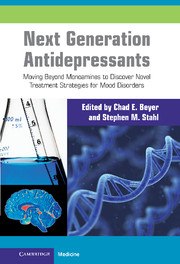 Next Generation Antidepressants
Next Generation Antidepressants Book contents
- Next Generation Antidepressants
- Next Generation Antidepressants
- Copyright page
- Contents
- Contributors
- Preface
- Abbreviations
- Chapter 1 Current depression landscape
- Chapter 2 Novel therapeutic targets for treating affective disorders
- Chapter 3 Developing novel animal models of depression
- Chapter 4 Translational research in mood disorders
- Chapter 5 Defining depression endophenotypes
- Chapter 6 Genetic and genomic studies of major depressive disorder
- Chapter 7 Medicinal chemistry challenges in the design of next generation antidepressants
- Chapter 8 Application of pharmacogenomics and personalized medicine for the care of depression
- Index
- References
Chapter 5 - Defining depression endophenotypes
Published online by Cambridge University Press: 19 October 2021
- Next Generation Antidepressants
- Next Generation Antidepressants
- Copyright page
- Contents
- Contributors
- Preface
- Abbreviations
- Chapter 1 Current depression landscape
- Chapter 2 Novel therapeutic targets for treating affective disorders
- Chapter 3 Developing novel animal models of depression
- Chapter 4 Translational research in mood disorders
- Chapter 5 Defining depression endophenotypes
- Chapter 6 Genetic and genomic studies of major depressive disorder
- Chapter 7 Medicinal chemistry challenges in the design of next generation antidepressants
- Chapter 8 Application of pharmacogenomics and personalized medicine for the care of depression
- Index
- References
Summary
It is widely assumed that major depressive disorder (MDD) includes a heterogeneous mix of conditions reached through multiple etiological and pathophysiological processes. In recent years, efforts to parse the heterogeneity inherent to MDD have led to renewed interest in identifying potential depressive “endophenotypes” – intermediate phenotypes hypothesized to lie within the etiological link between genes and clinical disease. In this chapter, we begin with an overview of the endophenotype concept and its central criteria (clinical and biological plausibility, specificity, state-independence, heritability, familial association, and cosegregation). Next, we examine the potential utility of applying an endophenotypic approach to depression research, with a focus on anhedonia as a particularly promising depressive endophenotype. To this end, we review and integrate findings across epidemiological, behavioral, neuroimaging, and genetic studies to assess anhedonia within the endophenotypic criteria. Following this examination, we discuss current directions in the development of objective laboratory-based measures of anhedonia and their value in facilitating a more precise identification of the psychological and neurobiological mechanisms underlying anhedonia. We conclude that utilizing an endophenotypic approach may improve our understanding of the etiology and pathophysiology of depression, which would ultimately enhance our ability to design more effective treatment and prevention strategies.
- Type
- Chapter
- Information
- Next Generation AntidepressantsMoving Beyond Monoamines to Discover Novel Treatment Strategies for Mood Disorders, pp. 70 - 89Publisher: Cambridge University PressPrint publication year: 2010
